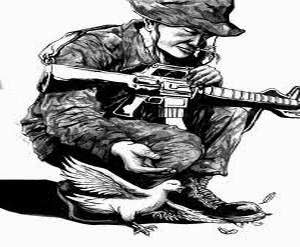
From the Website of Commission on Human Rights
Statement
of the Commission on Human Rights calling for the strengthening of our
justice system in addressing the culture of impunity in the PhilippinesThe Commission on Human Rights (CHR) urges the government to act on the appalling number of extrajudicial killing cases in the country, and instead of denying the existence of culture of impunity, exhaust all the necessary measures to strengthen the criminal justice system and hold to account the perpetrators of these violations.
In the recently released 2017 Global Impunity Index, it is of grave concern to see the Philippines ranked with the highest level of impunity among 69 nation states.
The study adopts the United Nations’ definition of impunity as “the impossibility, de jure or de facto, of bringing the perpetrators of violations to account—whether in criminal, civil, administrative or disciplinary proceedings—since they are not subject to any inquiry that might lead to their being accused, arrested, tried and, if found guilty, sentenced to appropriate penalties, and to making reparations to their victims”.
Now that thousands of deaths related to the ongoing campaign against illegal drugs have been documented and yet no one has been prosecuted, it clearly speaks of how the Philippine government failed to fulfill its obligation to conduct investigations, prosecute, and convict those responsible for violating human rights. This accurately shows that impunity persists in our society. The government must create an environment conducive to the protection of human rights, and tolerance of impunity is a violation in itself.
The Commission reminds the government that waging a war against illegal drugs and acts of terrorism must also be coupled with strong drive to hold perpetrators to account. Peace, order, and security of the country can only be obtained if wheels of justice are reinforced to prosecute individuals/organizations responsible for these crimes. Only by bringing the perpetrators to court can affirm the rule of law and restore trust in the institutions of society.
Accordingly, the Commission stresses that despite the abundance of Philippine laws that provides for the protection of human rights, impunity continues to destabilize the social, political, and economic systems which hamper the country’s development and threatens people’s democracy. Free movement of perpetrators in the public, especially those who remain in their powerful positions and have the ability to protect themselves from prosecution, breeds not only loss of trust in justice, but also an ongoing threat and fear-mongering among the public.
In response to the mandamus filed by human rights lawyers asking government agencies, such as the Philippine National Police (PNP), Department of Justice, Supreme Court, and the CHR to investigate all cases of extrajudicial killing and arbitrary executions in the country, the Commission welcomes it by staying faithful to its mandate of conducting motu proprio investigations on all forms of human rights violations.
The CHR, on 29 August 2017, met with the leadership of the PNP to enjoin them in establishing a joint task force that will conduct an audit and inventory of cases of extrajudicial killings. Although it became an opportunity for discussion between the two agencies to address the rising death toll related to the campaign against illegal drugs, the PNP’s denial to share police spot reports makes the investigation more arduous for the Commission and other human rights groups. The CHR, nevertheless, continues to look forward to other opportunities for constructive engagement with the PNP in the future. ###
Contact Person:
Atty. Jacqueline Ann C. de Guia
Director, Public Affairs and Strategic Communication Office
Telephone No: (02) 928-5792 / 0977 284 0787
Email address: comms.chr@gmail.com
CHR Website
http://www.chr.gov.ph/
http://www.chr.gov.ph/
links:
OTHER HUMAN RIGHTS PROMOTIONS WEBSITES
Human Rights Promotions - Google Human Rights Promotions - Blogspot
Human Rights Promotions - Webs.com
Human Rights Promotions - Google Human Rights Promotions - Blogspot
Human Rights Promotions - Webs.com
PROTECTION AND PROMOTION OF HUMAN RIGHTS
———————————————————————————————–
————————————————————
——————————
————————————————————
——————————
























0 comments:
Post a Comment